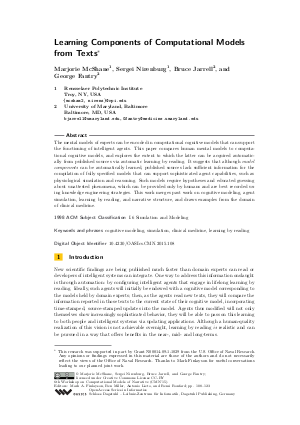Learning Components of Computational Models from Texts
Authors Marjorie McShane, Sergei Nirenburg, Bruce Jarrell, George Fantry
-
Part of:
Volume:
6th Workshop on Computational Models of Narrative (CMN 2015)
Part of: Series: Open Access Series in Informatics (OASIcs) - License:
 Creative Commons Attribution 3.0 Unported license
Creative Commons Attribution 3.0 Unported license
- Publication Date: 2015-08-14
File

PDF
OASIcs.CMN.2015.108.pdf
- Filesize: 497 kB
- 16 pages
Document Identifiers
Subject Classification
Keywords
- cognitive modeling
- simulation
- clinical medicine
- learning by reading
Metrics
- Access Statistics
-
Total Accesses (updated on a weekly basis)
0PDF Downloads0Metadata Views
Abstract
The mental models of experts can be encoded in computational cognitive models that can support the functioning of intelligent agents. This paper compares human mental models to computational cognitive models, and explores the extent to which the latter can be acquired automatically from published sources via automatic learning by reading. It suggests that although model components can be automatically learned, published sources lack sufficient information for the compilation of fully specified models that can support sophisticated agent capabilities, such as physiological simulation and reasoning. Such models require hypotheses and educated guessing about unattested phenomena, which can be provided only by humans and are best recorded using knowledge engineering strategies. This work merges past work on cognitive modeling, agent simulation, learning by reading, and narrative structure, and draws examples from the domain of clinical medicine.
Cite As Get BibTex
Marjorie McShane, Sergei Nirenburg, Bruce Jarrell, and George Fantry. Learning Components of Computational Models from Texts. In 6th Workshop on Computational Models of Narrative (CMN 2015). Open Access Series in Informatics (OASIcs), Volume 45, pp. 108-123, Schloss Dagstuhl – Leibniz-Zentrum für Informatik (2015)
https://doi.org/10.4230/OASIcs.CMN.2015.108
BibTex
@InProceedings{mcshane_et_al:OASIcs.CMN.2015.108,
author = {McShane, Marjorie and Nirenburg, Sergei and Jarrell, Bruce and Fantry, George},
title = {{Learning Components of Computational Models from Texts}},
booktitle = {6th Workshop on Computational Models of Narrative (CMN 2015)},
pages = {108--123},
series = {Open Access Series in Informatics (OASIcs)},
ISBN = {978-3-939897-93-4},
ISSN = {2190-6807},
year = {2015},
volume = {45},
editor = {Finlayson, Mark A. and Miller, Ben and Lieto, Antonio and Ronfard, Remi},
publisher = {Schloss Dagstuhl -- Leibniz-Zentrum f{\"u}r Informatik},
address = {Dagstuhl, Germany},
URL = {https://drops.dagstuhl.de/entities/document/10.4230/OASIcs.CMN.2015.108},
URN = {urn:nbn:de:0030-drops-52856},
doi = {10.4230/OASIcs.CMN.2015.108},
annote = {Keywords: cognitive modeling, simulation, clinical medicine, learning by reading}
}
